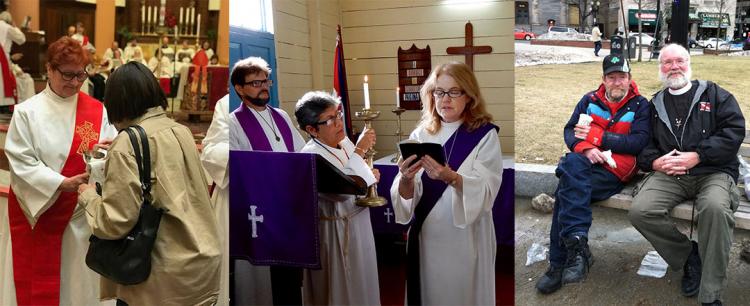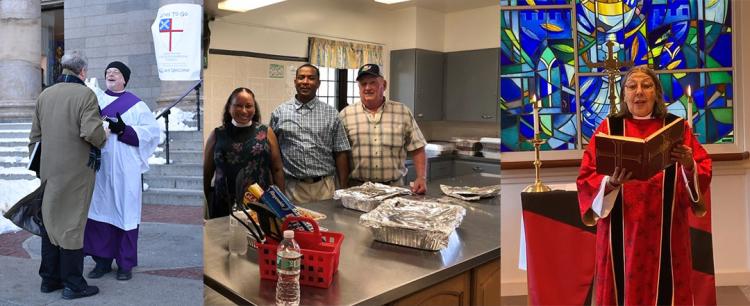How do you know a deacon when you see one?
In church, the deacon will be the one wearing a stole crosswise over the left shoulder and taking particular roles during worship—proclaiming the Gospel, preparing the altar during Communion, dismissing the congregation to go in peace to love and serve the Lord—all symbolic of the deacon’s charge to be a servant leader.
Outside of church, you might also recognize them by their bridging ministries—as hospital chaplains, for example, or elder care advocates, ministers working outdoors with people experiencing homelessness, or a missioner leading teens on borderlands pilgrimages to learn about the plight of migrant people. Deacons are social workers, teachers, musicians, artists, community organizers, lawyers, health care and public safety workers—people called to ordained ministry from many professions to serve those most in need and to encourage others to do the same.
“The beauty of that in our tradition is that all the tasks that deacons have in the liturgy point not at us or at the liturgy itself, but they point at our roles in the world,” the Ven. Christiaan Beukman said in a recent interview. “So when we do the dismissal, for example, it is a way of saying to the people: The worship is over but the service is just starting, and when you go through that exit door, you enter the mission field.”
The diaconate is one of three distinct orders of ordained ministry in The Episcopal Church—there are deacons, priests and bishops—and those called to the diaconate as a vocation serve under the direction of their bishops and are assigned to congregations and communities for certain periods of service. (Deacons are different from transitional deacons, who are called to the priesthood and are first ordained to the diaconate for a transitional year or so.)
“We have made promises at our ordination that we will not be in the church but of the church, and that our ministry is out in the world, that we will translate the needs of the people back to the church,” Beukman explained. “So we’re interpreters of the needs of the world, especially of the weak, the sick and the lonely. That says it all for us as deacons.”
Beukman serves as an archdeacon in the Diocese of Massachusetts alongside the Ven. Patricia Zifcak—he coordinating the assignment of deacons to congregations and she the formation program for those preparing to be ordained as deacons.
“A priest’s ministry is to build up the body of Christ in a particular place, and a deacon’s ministry is to gather people for ministry but beyond any one particular parish,” Zifcak said, during the same interview. “So our ministry is really about sending out into the world people who are members of a congregation to answer the needs of the world as the church has the ability to do, and it’s also to gather people who may not know the church in a way that welcomes them.”
The Diocese of Massachusetts has been ordaining deacons for 20 years, and although there are currently about 40 actively serving in congregations and ministries, the order of deacons and their role is still not widely understood, Beukman and Zifcak said.
So this year, the bishops have set aside June 13 as Diaconate Sunday and an opportunity to introduce more people to the life and work of deacons. Congregations have been invited to request a deacon to be with them and preach during services on June 13, when the church calendar celebrates St. Efrem of Syria, a deacon venerated in both Eastern and Western church traditions.
A video about the ministry of deacons is also being created for use on Diaconate Sunday and beyond.
In addition to celebrating the ministry of deacons in this diocese, a hope for Diaconate Sunday, Beukman and Zifcak said, is that it will inspire more congregations to explore how a deacon’s servant leadership among them might benefit their communities and outreach.
“Every congregation that requests a deacon feels like an opportunity for a deacon to use their many gifts in a variety of ways as they come in contact with the members of a congregation who might have a dream or a hope for a ministry and just need that sort of energizer or guide to help them to bring it from a dream to a reality,” Zifcak said.
She and Beukman also hope Diaconate Sunday will spur those wondering about their own call to ordained ministry to initiate a conversation.
“If someone is beginning to wonder about call, one of the primary first steps is to meet with their own priest in their congregation to share how they are perceiving a call to ministry, and that really can be the first step in beginning this process of discernment and then formation,” Zifcak said.
“At this point we’re particularly interested in talking with people of color about the diaconate, and people who are bilingual, especially in Spanish and English and in Portuguese and English,” Beukman added. “We’d love to see the diversity growing.”
--Tracy J. Sukraw
To invite a deacon to preach on Diaconate Sunday, June 13, contact David Ames at dames@diomass.org to inquire about availability. For more information about deacons, formation and ministry, and congregational placements in the Diocese of Massachusetts, visit www.diomass.org/deacons.


